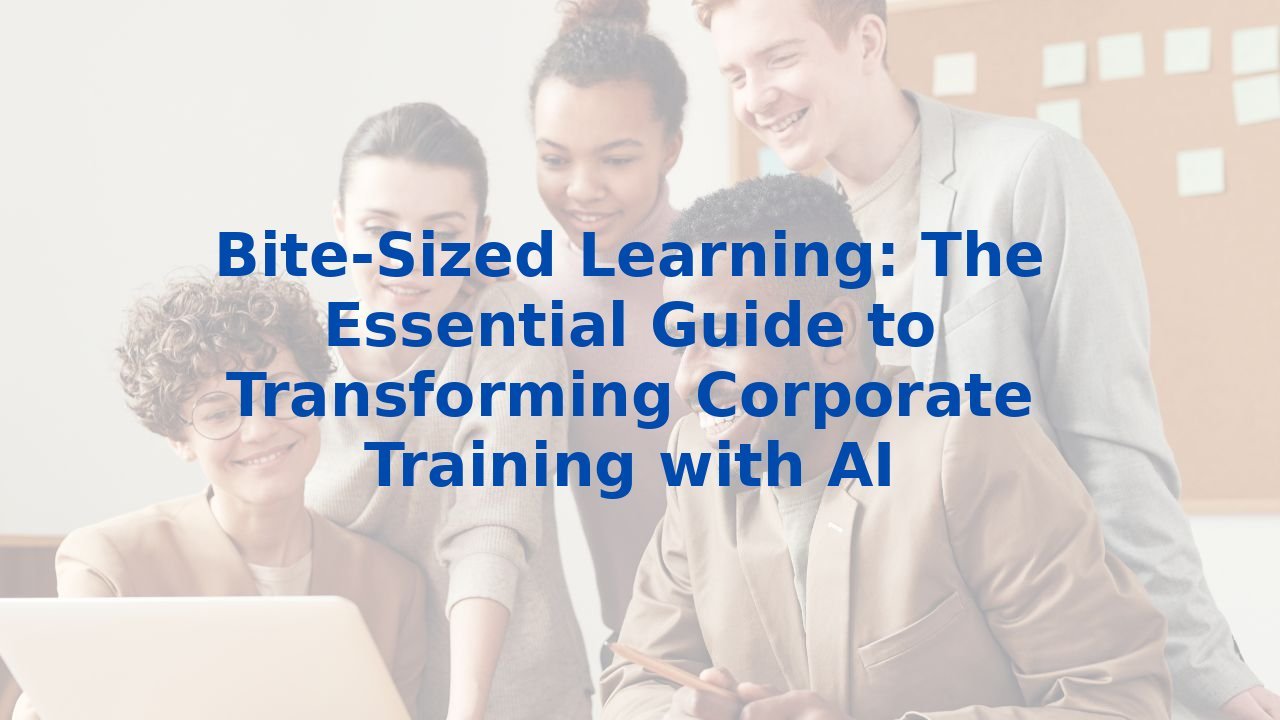Bite-Sized Learning: The Essential Guide to Transforming Corporate Training with AI
Bite-Sized Learning: The Essential Guide to Transforming Corporate Training with AI
In the ever-evolving landscape of corporate learning, the traditional methods that once defined training programs are no longer meeting the demands of today's fast-paced business environment. As companies strive to foster a culture of continuous learning, the introduction of bite-sized learning coupled with Artificial Intelligence (AI) is reshaping the training paradigm. This guide explores how AI enhances corporate training by making it efficient, personalized, and strategically aligned with both employee and organizational growth.
The Essence of Corporate Training Today
At its core, corporate training is designed to enhance employee competencies through various educational programs. These range from onboarding new hires to ongoing professional development for current staff. In an age where attention spans are fleeting, conventional training methods, often reliant on lengthy lectures or dense reading materials, can disengage learners. The shift toward bite-sized learning presents a solution that aligns perfectly with modern work habits.
The Role of AI in Corporate Training
Artificial Intelligence is no longer just a futuristic concept; it's a transformative force in the realm of corporate training. By harnessing technologies such as Machine Learning (ML) and Natural Language Processing (NLP), AI systems can analyze vast data sets to create a more adaptive and effective learning experience.
Key Benefits of Integrating AI in Corporate Training
1. Cost Reduction and Time Efficiency
AI-infused learning platforms provide immediate, on-demand access to a diverse array of training resources, significantly diminishing costs associated with physical spaces, trainer fees, and printed materials. Reports suggest that organizations leveraging AI in employee training can reduce costs up to 30%, enabling funds to be redirected toward other strategic initiatives.
2. Effective Content Creation
The ability to generate high-quality training content swiftly is a game-changer. AI tools streamline the creation process, minimizing human error while maximizing efficiency. This capability allows training leaders to focus more on strategy and less on the labor-intensive aspects of content development.
3. Streamlined Onboarding Training
AI-driven tools are particularly impactful in onboarding processes. New hires benefit from tailored learning paths that enhance their transition into the organization. Coupled with AI-driven support bots, employees can receive immediate assistance, fostering a more engaging and productive experience right from the start.
4. Personalized Learning Experience
Personalization is at the heart of effective training. AI has the capability to assess individual learning needs, adapting content and delivery methods accordingly. By catering to unique preferences, organizations can significantly enhance knowledge retention and application in practical scenarios, making training both relevant and engaging.
5. Data-Driven Insights
Data analytics empowered by AI enables organizations to evaluate employee performance and learning trends effectively. This real-time feedback loop informs training strategies, ensuring they remain aligned with both organizational objectives and employee aspirations.
Real-World Use Cases
1. Boosting Employee Engagement
AI tools, like chatbots and virtual assistants, deliver immediate support, maintaining a high level of interactivity during training sessions. This approach not only fosters a more enjoyable learning environment but enhances the overall effectiveness of the training.
2. Promoting Continuous Learning
With AI's ability to provide customized resources, employees are empowered to pursue ongoing skill development tailored to their current roles and future career aspirations. This fosters a growth mindset, ensuring that organization members stay competitive in their fields.
3. Enhancing Onboarding
AI enhances the onboarding experience by curating personalized learning paths for new employees, facilitating quicker adaptation and immediate contributions to team goals.
Considerations and Future Possibilities
While the integration of AI in corporate training comes with abundant advantages, certain considerations must be embraced. Ethical concerns surrounding data privacy and accessibility need to be prioritized to foster inclusive learning environments. Trust in technology is pivotal, which requires organizations to implement robust data security measures and ethical AI practices.
Looking ahead, the future of corporate training is inextricably linked to ongoing advancements in AI. As organizations adapt to the changing needs of their workforce, incorporating AI into training strategies will become not only beneficial but essential.
Conclusion
In summary, AI is not just a passing trend; it's a catalyst that is fundamentally reshaping corporate training. By embracing AI, organizations can expect notable improvements in cost efficiency, content quality, onboarding speed, and personalization of learning experiences. As this technology continues to evolve, investing in AI-enhanced training will transform employees into lifelong learners and ultimately lead to greater organizational success.
To explore how AI can elevate your organization's training programs, consider complete AI training solutions designed to equip your workforce with essential skills for the future.



